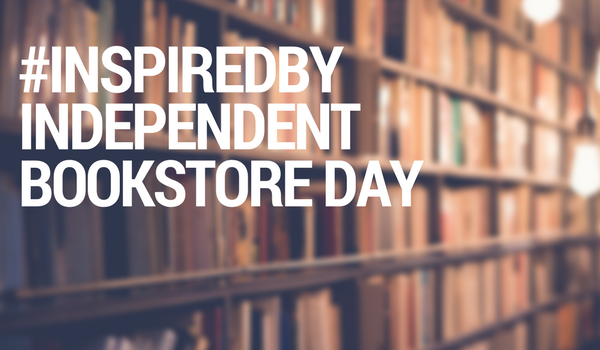
Last April I spent a very rainy and cold Saturday traveling around Chicago with some friends, running in and out bookstores, collecting punchcards. It was the last Saturday of the month—Independent Bookstore Day—and we were participating in the first My Chicago Bookstore Challenge: if you visited 10 of the participating independent bookstores throughout the city and suburbs, you received a 10% discount from all participating stores for the next year; if you visited 15, you got 15%. We succeeded in visiting 11 participating bookstores and several more that weren’t on the list, just for fun.
While Independent Bookstore Day is a national event—or holiday, depending on how you look at it—the My Chicago Bookstore Challenge adds a city-wide community feel to the day. It encourages people to see different parts of the city and surrounding areas and visit various bookstores, some of which they might not have visited otherwise. But not only does it promote bookstores throughout the metropolitan area, it also brings visitors to the neighborhoods the bookstores are in and possibly brings money to other businesses in the area.
Independent Bookstore Day itself has been celebrated for several years, with each individual store deciding on its own events, not necessarily concerned with partnering with other stores. I don’t think I was really aware of Independent Bookstore Day before last year, when a challenge—and an incentive—were issued.
While it might seem counterintuitive for similar businesses—who, on other days, might very well be competing against one another—to partner together, the My Chicago Bookstore Challenge has some great examples of how businesses can work together to promote sales and growth for everyone involved. Here are some ways you can learn about successful partnerships and how to market them from the My Chicago Bookstore Challenge example.
Begin the Partnership
The foundation for the whole challenge is the partnership the bookstores have with one another. I’m not sure how tightly connected the stores and their owners are throughout the year, but for at least one day out of 365, they come together to promote independent bookstores in general. It appears that the My Chicago Bookstore Facebook page posts events from participating stores throughout the year, which adds extra awareness to literary events.
What’s great about the partnership between all these different stores is that it seems that they understand their audience: book lovers. People who are really into books might have a favorite bookstore, but they’re also willing to find new bookstores, to explore new locations in search of that perfect book or that exceptional gift, to step into an unheard-of location for a reading or signing of a beloved author. They’re willing to try new stores to fit their needs at the moment, based on a variety of characteristics: product catalog, old vs new, customer service, events, ambiance, cost, and accessibility.
You can partner with other businesses that fill in the gaps in your product or service offerings, or set aside competition to group with like-minded businesses, or connect with those in your immediate vicinity. Neighborhood organizations, like a chamber of commerce or business alliance, are good examples to keep in mind, although their purpose usually focuses more on helping the business owner find resources or drawing people to the neighborhood in general, instead of focusing on one specific audience.
Once you’ve connected with a group of businesses, discuss the goals of the partnership: will you join together for events, advertise each other’s businesses, concentrate on brand awareness, or growing the businesses in general?
House Resources in a Central Location
After you’ve partnered with other businesses and settled on concrete goals, create a space to house all your resources. In a neighborhood organization, it’s usually a website, with a business directory page. With My Chicago Bookstore, it’s a Facebook page.
The page creates and posts events for literary happenings at participating independent bookstores across the city and suburbs. The page is a great place to start when looking for book-related gatherings and it can expose visitors to a variety of events and businesses. For this specific challenge, the organizers created a map of all participating stores in the area, making it easy to strategize how to get to ten or more all in one day. The link is included in the event details and from there, people can learn more about the stores or can navigate to the individual websites for more information.
Consider creating a microsite for your partnership that contains all of the pertinent information, like business names, addresses, phone numbers, and hours. Also include a short summary to tell people why you’re partnering together and how it’s beneficial to them; this will also help with SEO, which in turn will help make your partnership more visible. Make social accounts for the group and tag businesses when it’s relevant, making it easier for readers to connect with those they’d like to reach.
Incentives
The My Chicago Bookstore Challenge not only displays the partnership these bookstores have with each other, but it also provides an incentive to the audience to visit a significant number of stores in one day. With the varying shop hours and distance between stores, it’s hard to get to 10 stores in one day, let alone 15, but the effort is worth it to try to make it to that many. While 10% doesn’t seem like that much, it actually can add up quickly if you buy a lot of books over the course of a year. It also acts as an incentive to keep going back to the indie stores, instead of more corporate-owned bookstores, because you know you’ll get that discount. So the incentive drives sales on Independent Bookstore Day, but it also drives sales on a smaller scale throughout the year.
Incentives are an important part of getting new consumers interested in places they’ve never been before. It allows them to try out a new business without feeling pressure to overcommit. Neighborhood organizations often have holiday incentives to shop in the area or a restaurant might partner with a theater to give a discount when showing tickets for that night. It’s important that the incentives help a majority, if not all, of the businesses in the partnership; spreading the wealth is in the interest of the whole group. When individual businesses can see the benefit they’re receiving from the partnership, they’ll want to continue to be invested, helping the whole group thrive.
Marketing
When you’ve got your partnership, your goals, your online destination, and your incentives, now it’s time to tell the world. My Chicago Bookstore mostly relies on Facebook events and posts from the page to relay information to its audience. But the challenge has also been picked up by numerous news sources in the city, expanding the reach of the event. Each individual bookstore advertises the event on its website and in its newsletter to customers and contacts. There’s even several hashtags related to the event and people are encouraged to use the hashtags throughout the day. This helps estimate engagement, in addition to however the owners are keeping track of challenge-related bookstore visits.
There’s a whole subculture on social media dedicated to book lovers and pictures of books and ‘bookish’ life, and the hashtags play in to that already available space. I’m sure I’ll see loads of book pictures on my Instagram feed tomorrow.
Creating accounts specifically for your partnership was mentioned, but also consider adding hashtags to your marketing strategy for large events similar to the challenge. They focus more on the people partaking in the event than the businesses, which is good because the whole goal to to reach consumers and turn them into customers. Make sure all of your partner organizations are on board with helping carry the marketing weight and are excited to be involved. The whole idea is that the partnership can be mutually beneficial, driving sales of all of those involved, not one or two businesses specifically. If you’re targeting a specific audience, understand how they’re already interacting with one another and how you can seamlessly add to the conversation.
This Saturday I’ll be participating in the My Chicago Bookstore Challenge again, trying to get the elusive 15%. It’s a fun and busy day of looking at and buying books upon books, with maybe a magazine or greeting card thrown in for good measure. But it’s also a day to appreciate how businesses can work together to share the love of their products, for the benefit of not only themselves, but more importantly their customers.
If you’d like to create a marketing strategy for your business or partnership, contact us today.
